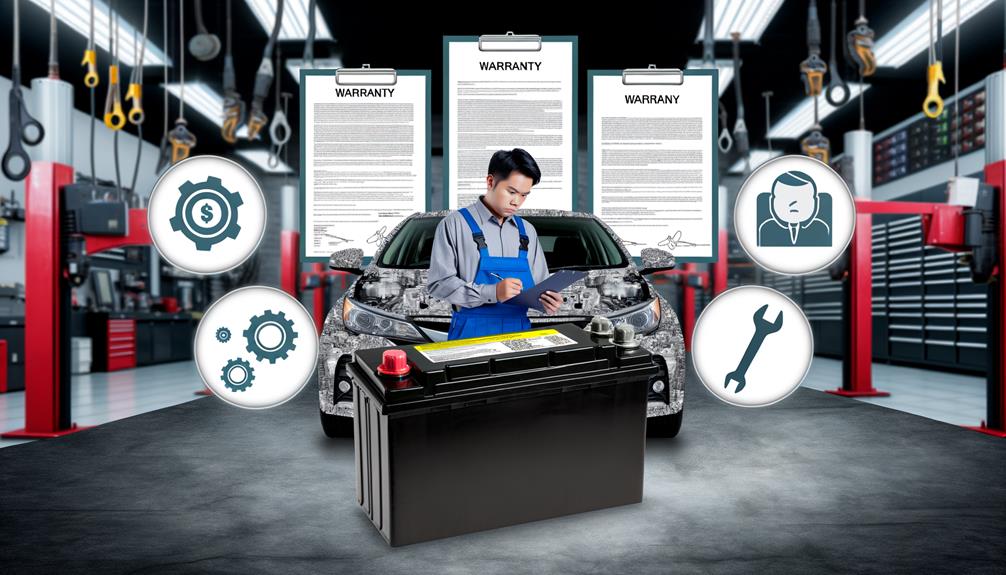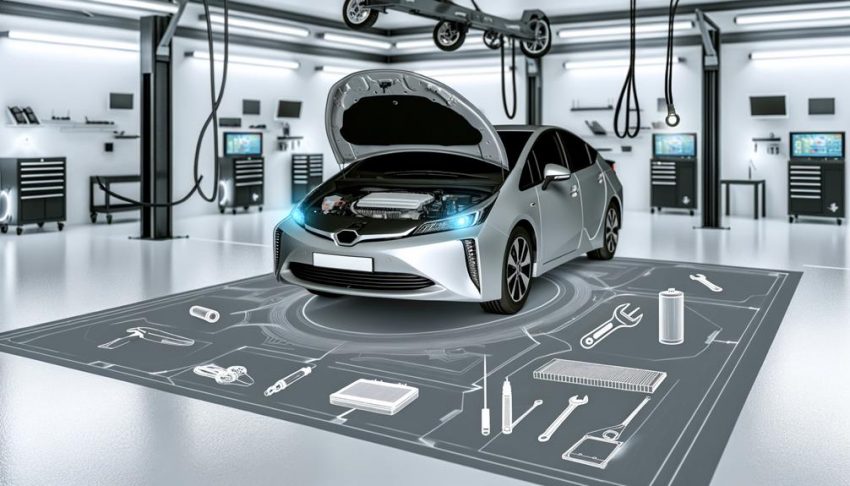When you're considering the cost of a battery for a hybrid car, you'll quickly find that it isn't a one-size-fits-all scenario. Prices can range from $1,000 to $8,500, influenced by factors like your car's make and model, the type of battery technology, and even where you live. For instance, a battery for a Toyota Prius typically runs around $3,800, but a more complex system like the one in a Ford Escape could set you back $8,500. But that's not all—labor costs and warranty options can also affect your final expense. Curious about how to navigate these costs effectively?
Contents
Factors Influencing Battery Cost
When you're considering the cost of a hybrid car battery, several vital factors come into play. Hybrid battery costs are influenced by a variety of elements that can notably affect the total expenses you're likely to incur. First and foremost, the make and model of your vehicle play a vital role. The replacement cost can range anywhere from $1,000 to $8,000, depending on the specific requirements of your car. High-end models typically have more expensive battery systems.
Another notable factor is the type of battery technology used. Most hybrid vehicles use either nickel-metal hydride (NiMH) or lithium-ion (Li-ion) batteries. Li-ion batteries are generally more expensive due to their advanced technology and superior performance characteristics. On the other hand, NiMH batteries, while cheaper, may not offer the same level of efficiency and longevity.
Labor costs are also an important consideration. Installing a new hybrid battery can add an extra $100 to $500 to your total expenses. The geographic location where you get the replacement done can also impact the overall cost. Prices can vary based on regional demand and the service rates of local shops.
Warranty coverage from the manufacturer can make a big difference in your out-of-pocket costs. Many manufacturers offer warranties that cover battery replacements for up to 8 years or 100,000 miles. This warranty can notably reduce the financial burden if your battery fails within the covered period.
Replacement Costs by Model
When considering the replacement costs of hybrid car batteries, you'll notice significant variations by brand. Toyota Prius batteries are among the most economical at around $3,800, while Ford Escape replacements can soar to $8,500. Don't forget that warranty coverage and installation fees will also impact your overall expenses.
Cost Variations by Brand
Understanding the cost variations by brand for hybrid car batteries can help you make a more informed decision when facing a replacement. Hybrid battery replacement costs can differ considerably between hybrid vehicles. For example, if you own a Toyota Prius, you're looking at an average hybrid battery cost of around $3,800. The Prius is known for its reliability and established technology, making its replacement costs relatively predictable.
On the other hand, if you're driving a Ford Escape hybrid, be prepared for a steeper price. Replacement costs for this model can reach approximately $8,500. This higher cost can be attributed to the Escape's complex battery system. Meanwhile, Honda Insight owners benefit from one of the more affordable hybrid battery replacements, averaging around $2,500.
For Chevrolet Volt owners, the hybrid battery cost varies between $3,000 and $5,000 depending on the model year and battery condition. Luxury hybrid vehicles, such as the Lexus RX 450h, often see replacement costs exceeding $5,000 due to their specialized components. When you need to replace a hybrid battery, consulting with a knowledgeable service team can provide further insights into these cost variations and help you plan accordingly.
Warranty Coverage Impact
While cost variations by brand provide a snapshot of potential expenses, warranty coverage plays a vital role in the actual out-of-pocket costs for hybrid battery replacement. Many hybrid vehicles come with warranties that cover battery replacements for up to 8 years or 100,000 miles, greatly reducing what you might end up paying. For instance, manufacturers like Honda and Toyota offer extended warranties that could cover the entire hybrid battery replacement cost, which can range from $2,000 to $8,000 depending on the model.
Luxury brands like Lexus and BMW often provide even longer warranty periods, potentially covering hybrid batteries for up to 10 years. This extended coverage not only boosts confidence in the reliability of the hybrid vehicle but also lessens financial stress. However, the impact of warranty coverage varies widely among models. Some vehicles may require battery replacement sooner than the warranty period, leading to unexpected expenses.
Understanding your vehicle's warranty coverage is essential. OEM parts and how long the battery lasts will largely determine the long-term financial implications of owning a hybrid vehicle. Always check the specific warranty terms to guarantee you're protected against hefty replacement costs.
Installation and Labor Fees
Replacing a hybrid car battery involves more than just the cost of the battery itself; installation and labor fees can greatly impact your overall expenses. The installation time can range from 1 to over 6 hours, depending on your vehicle's complexity and model. This variability means your total hybrid battery replacement cost can fluctuate considerably.
Labor costs for this service typically range from $100 to $500. Hourly labor rates can vary widely, and given the specialized nature of hybrid battery installation, these rates can add several hundred dollars to your final bill. The complexity of your vehicle's hybrid system often necessitates technicians with specialized training, further influencing labor costs.
When scheduling a service appointment, keep in mind that your geographic location can affect both labor costs and the availability of parts. This regional variation can lead to differences in total installation fees, making it essential to shop around and compare quotes from different service providers. By understanding these factors, you can better anticipate the full cost of a hybrid battery replacement and make more informed decisions about maintaining your vehicle.
Battery Lifespan Expectations

Hybrid car batteries, the heart of your vehicle's eco-friendly performance, typically boast a lifespan of 8 to 15 years, translating to about 100,000 to 150,000 miles. How long a hybrid battery lasts is influenced by several factors, including regular maintenance and usage patterns. To guarantee you get the most out of your hybrid system, it's essential to adhere to recommended maintenance schedules and monitor the battery's health consistently.
Here's what you can do to maximize your hybrid battery's lifespan:
- Regular Maintenance: Consistently servicing your vehicle according to the manufacturer's guidelines helps in identifying potential issues early and keeping the hybrid system in peak condition.
- Monitoring Performance: Using diagnostic tools or professional services to regularly check the battery's health can help detect performance degradation early, allowing for timely interventions.
- Driving Habits: Gentle acceleration and braking can reduce strain on the battery, extending its life and improving overall vehicle efficiency.
Replacement costs for hybrid batteries can be significant, typically ranging from $1,000 to $6,000 depending on the make and model of your vehicle. However, many manufacturers offer warranties covering up to 8 years or 100,000 miles, providing some peace of mind. These warranties can sometimes cover the entire replacement cost or at least a substantial portion of it.
While the upfront cost of a hybrid battery replacement might seem intimidating, the long-term savings in fuel and maintenance costs often justify the investment. By staying proactive about regular maintenance and mindful driving habits, you can help guarantee your hybrid battery lasts well beyond the average expectations, making your eco-friendly ride both reliable and economical.
Impact of Extreme Temperatures
Understanding how to maximize your hybrid battery's lifespan through regular maintenance and mindful driving habits is just one piece of the puzzle. Extreme temperatures can have a profound impact on your hybrid battery's performance and longevity, and knowing how to manage these conditions is vital.
When it comes to high temperatures, they can cause the components within your hybrid battery to degrade more rapidly. This degradation not only decreases the battery's capacity but also affects its overall health. You'll notice a decline in performance, which could translate to less efficient fuel use and shorter driving ranges. Essentially, heat accelerates the aging process of the battery, making it important to avoid prolonged exposure to high temperatures whenever possible.
On the flip side, extreme cold isn't any kinder to your hybrid battery. Cold weather slows down the chemical reactions inside the battery, leading to reduced power output. You'll find that your hybrid vehicle's range decreases in cold conditions, and the battery may struggle to deliver consistent power. This fluctuation can result in less predictable performance and efficiency, especially in regions with significant temperature swings.
To mitigate these effects, regular monitoring and maintenance of your hybrid battery are vital. Keeping an eye on temperature exposure and ensuring your vehicle is parked in a controlled environment when not in use can help. Additionally, some hybrid models come with battery thermal management systems designed to maintain ideal operating temperatures, further enhancing performance and longevity.
Warranty and Coverage Options

When considering the long-term investment in a hybrid vehicle, warranty and coverage options for the battery are vital factors to evaluate. Hybrid batteries are a significant component, and understanding the warranty terms can save you from unexpected replacement costs down the line.
Most hybrid vehicle manufacturers offer warranties that cover battery replacements for a period of 8 years or 100,000 miles. Some manufacturers, like Toyota, even extend this to up to 10 years or 150,000 miles for certain models. These warranties are designed to provide peace of mind and protect against premature battery failure. However, coverage options can vary by manufacturer, so it's important to review the specifics for your particular vehicle.
To guarantee you're fully protected, consider the following:
- Extended Warranty Plans: These can be purchased to provide additional coverage beyond the standard warranty period. If you're concerned about future replacement costs, an extended warranty might be a worthwhile investment.
- State Regulations: Some states have specific regulations that require hybrid battery warranties to cover a minimum battery lifespan. This guarantees a baseline level of consumer protection, but it's good to verify what's required in your state.
- Service History Documentation: Keeping detailed records of your vehicle's service history is vital. This documentation can be important when validating warranty claims and guaranteeing you receive the coverage you're entitled to.
Cost-Saving Tips and Alternatives
Cutting down on the costs associated with hybrid car batteries doesn't have to be intimidating if you know where to look. One of the best ways to reduce costs is by taking advantage of manufacturer warranties. Many hybrid car batteries are covered for up to 8 years or 100,000 miles, minimizing the need to replace the battery out of pocket within this period. Always check your warranty before making any decisions.
Another cost-saving tip is to explore aftermarket battery options. These alternatives can range from $500 to $3,500, offering significant savings compared to original equipment manufacturer (OEM) batteries. However, be mindful of the potential impacts on performance and warranty conditions. Choosing a reputable supplier can help mitigate some risks associated with aftermarket products.
Regular maintenance and monitoring of your hybrid car battery's health are essential for extending its lifespan. Simple actions like keeping the battery clean and ensuring proper charging can delay the need for a costly replacement. This proactive approach can offer substantial long-term savings.
Don't overlook the value of coupons and service specials from dealerships or service centers. These promotions can lower the overall costs of battery replacements and installations. It's worth regularly checking for any available deals that can lighten your financial load.
Lastly, consider the total cost of ownership when budgeting for your hybrid vehicle. Anticipating potential battery replacement costs and incorporating them into your financial planning can prevent unexpected expenses. By following these cost-saving tips and alternatives, you'll be better prepared to manage the financial aspects of maintaining a hybrid car battery.
Frequently Asked Questions
How Long Will a Battery Last in a Hybrid Car?
The battery lifespan in a hybrid car typically ranges from 8 to 15 years. Factors like hybrid battery maintenance, driving habits impact, climate effects, and battery technology advancements can greatly influence longevity. Proper care guarantees peak performance.
How Much Does It Cost to Replace a Hybrid Car Battery?
When considering battery replacement options, you'll find costs range from $2,000 to $8,000. Conduct a cost comparison analysis, considering hybrid battery lifespan, warranty coverage details, and aftermarket battery solutions, which may affect performance and reliability.
Is It Worth Replacing Hybrid Battery?
Replacing a hybrid battery can be worth it due to enhanced battery performance and replacement benefits. Warranty coverage reduces costs while better fuel efficiency and lower environmental impact provide long-term savings. Compare costs and benefits before deciding.
Can You Drive a Hybrid Without the Battery?
You can drive a hybrid without the battery, but hybrid performance will suffer. Proper battery maintenance is essential for maximizing electric range and utilizing charging options. Hybrid technology is designed for peak efficiency, so address battery issues promptly.
Conclusion
To sum up, understanding the factors influencing hybrid car battery costs can save you time and money. The price varies by model, technology, and location, with replacements ranging from $1,000 to $8,500. Labor costs and warranty options can also impact your total expense. Knowing your battery's lifespan and the effects of extreme temperatures can help you plan better. By exploring cost-saving tips and alternatives, you'll be better equipped to manage your hybrid car's battery needs efficiently.
